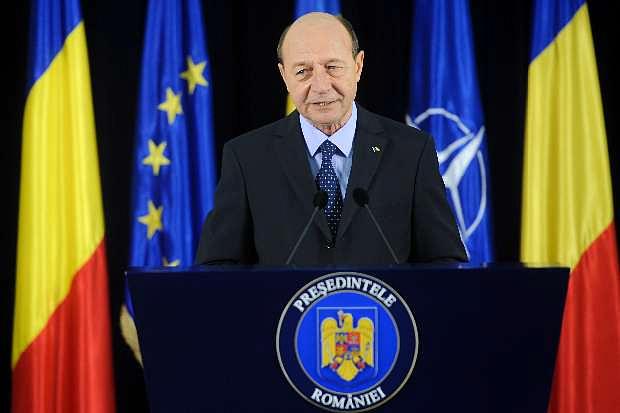Romania’s Parliament will carry investigation on 2009 presidential elections amid fraud allegations



Liviu Dragnea and Calin Popescu Tariceanu, the leaders of the governing Social Democratic Party (PSD) and Liberal-Democratic Alliance (ALDE) and presidents of the Romanian Chamber of Deputies and Senate, said that they would ask the Parliament to set up a committee that would investigate “aspects related to the organization of the 2009 presidential elections and their outcome.”
The request comes after journalist Dan Andronic, who worked as a campaign consultant to former President Traian Basescu, recently wrote that on the presidential election day he took part in a meeting at the house of former interior minister Gabriel Oprea, where heads of the National Anticorruption Directorate (DNA) and the Romanian Intelligence Service (SRI) were also present and were discussing about the vote results.
Moreover, Andronic suggested in his article that George Maior, Florian Coldea, Laura Codruta Kovesi, and Gabriel Oprea had an essential contribution to getting Basescu reelected.
Andronic’s statement triggered reactions from both Traian Basescu and his opponent in the 2009 elections, former PSD leader Mircea Geoana.
Basescu said in a talk show at Romania TV news channel that the scenario in which SRI helped him win the elections was childish, given that SRI director George Maior was a former PSD member and had connections with PSD. He added that neither SRI deputy director Florian Coldea nor Laura Codruta Kovesi, who was Romania’s General Prosecutor at that time, would have dared to get him involved in any scheme to rig the elections.
“Codruta Kovesi was about 29 when I named her General Prosecutor, bringing her from Sibiu. Coldea was a major and I made him the first deputy director of SRI. Can you imagine these people would have ever dared to say: Mr. President, we are the state, we guarantee you the second mandate? I would have beaten them to a pulp,” Basescu said.
Meanwhile, Mircea Geoana said that he hoped that the authorized institutions would shed light on this shadowy moment in Romania’s history, when a “gang fighting for survival changed the will of the people.” “Yes, the 2009 elections were rigged and I think that all was done with Basescu’s approval and even at his request,” Geoana wrote on Facebook.
The 2009 presidential elections were one of the most memorable moments in local politics. After a narrow victory in the first round, the incumbent president Traian Basescu, was far behind in the polls for the second round after liberal leader Crin Antonescu, who had come out third, threw his support behind PSD’s Mircea Geoana. Geoana and Antonescu got some 51% of the votes in the first round compared to Basescu’s 33%.
On December 6, the day of the second round, the exit-polls showed Mircea Geoana as the winner of the elections. He even held a victory speech thanking Romanians for voting him president. Meanwhile, Basescu said that the results were too tight to call a winner. Overnight, the vore counting showed a different picture and in the morning Basescu came in front, with 50.4% of the votes compared to Geoana’s 49.6%. It was one of the tightest results ever as the two were separated by only 70,000 votes, according to the final counting.
Basescu’s victory came from the votes abroad, which were not taken into account in the exit-polls. Geoana said PSD would challenge the elections’ result at the Constitutional Court and bring evidence to show the fraud at the polls. The current PSD leader Liviu Dragnea, who was the party’s secretary at that time, said that “Romanians voted for Mircea Geoana, but Basescu’s state apparatus turned him into the election winner by fraud.”
Victor Ponta, who was Geoana’s campaign manager at that time, made a controversial statement saying that Basescu and the political party that supported him, PDL, had a “better system” than his own party. We knew we would have to fight them. We needed to win by a margin of some 10% not to have to fight them, but we didn’t win by 10%, we probably only won by 3-4%. And their system was better,” Ponta said.
The Constitutional Court ordered the cancelled votes to be recounted, as there had been almost 140,000 canceled votes while the distance between the two candidates was only 70,000 votes. However, the recount didn’t change the result and the Constitutional Court validated the elections and confirmed Basescu’s reelection.
The re-ignition of this scandal comes as the DNA chief prosecutor Laura Codruta Kovesi has been under great pressure in recent months. PSD together with former Prime Minister Calin Popescu Tariceanu, as well as former President Basescu and his allies have been attacking DNA for allegedly turning the fight against corruption into an instrument to neutralize the top politicians in Romania and keep them under the “System’s” control. The System that PSD and other politicians are referring to would involve DNA prosecutors, SRI officers, judges, and other people in key positions.
Most of the politicians who have been talking about this alleged system, including Dragnea, Tariceanu, and Basescu are either investigated by DNA or have family members and friends investigated by the DNA. Dan Andronic, the journalist who made the revelation about the night of the 2009 elections, is also being prosecuted in several DNA cases.
editor@romania-insider.com